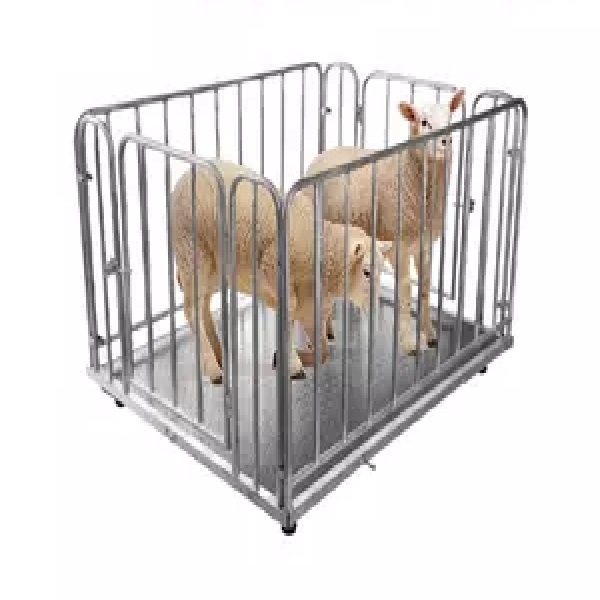Animal weighing scales are specially designed scales used to accurately measure the weight of live animals, ranging from small pets to large livestock like cattle, horses, or pigs. These scales are crucial in veterinary care, livestock farming, and animal research for monitoring health, growth, and medication dosages.
Key Features of Accurate Animal Weighing Scales:
- Durable Platform
- Built to withstand movement and weight from restless animals.
- Often made of non-slip, heavy-duty materials like steel or rubber-coated surfaces.
- Cage or Enclosure
- Many include side rails, gates, or cages to safely confine the animal during weighing.
- Shock-Absorbing Load Cells
- Designed to deliver accurate readings even when animals move or shift weight.
- Hold Function
- Locks the weight on the display even if the animal is moving, improving accuracy.
- Ramp Access (for large animals)
- Low-profile platforms with ramps make it easier for animals to step on.
Common Types:
- Small Animal Scales: Used in veterinary clinics for cats, dogs, and other pets.
- Livestock Scales: Large platform scales with gates, used on farms for cattle, sheep, goats, pigs, etc.
- Portable Animal Scales: Lightweight, battery-operated, and easy to transport for mobile vet services or remote farms.
Where They’re Used:
- Veterinary Clinics – for accurate weight-based medication dosing.
- Farms and Ranches – to monitor growth rates, feeding programs, and market readiness.
- Animal Research – for precise data in scientific studies.
- Zoos and Sanctuaries – for routine animal health checks.
Benefits of using animal weighing scales
- Promotes animal health and welfare
- Supports accurate dosing and feeding
- Increases efficiency in livestock management
- Reduces stress with faster and safer weighing

Tips for Accurate Animal Weighing
- Calibrate the Scale Regularly
- Use certified test weights or follow the manufacturer’s instructions.
- Calibrate before first use and on a schedule (weekly or monthly, depending on use frequency).
- Use the Tare Function
- If the animal is in a crate or on a mat, tare the scale first to remove that weight.
- This ensures only the animal’s weight is measured.
- Place the Scale on a Level Surface
- Uneven ground can distort weight readings.
- Use a flat, stable area free from vibration or slope.
- Minimize Animal Movement
- Keep the animal calm—use gentle handling or familiar environments.
- Some scales have a “hold” function that locks in the weight despite slight movement.
- Weigh at the Same Time of Day
- Weighing consistently (e.g., before feeding) helps track accurate weight trends.
- Use Enclosures or Side Rails
- For larger or more restless animals, use a scale with cages or rails to reduce movement.
- Zero the Scale Before Every Use
- Reset the scale to zero before placing the animal to avoid cumulative errors.
- Account for Temperature and Humidity
- In extreme conditions, let the scale adjust to ambient temperature before weighing.
- Keep the Scale Clean
- Remove debris, mud, or waste from the platform to prevent inaccurate readings.
- Document Each Reading
- Use software integration, printed logs, or manual records to track animal health over time.
Scale Recommendations by Animal Size at Accurate Weighing Scale Store
1. Small Animals (0.1 – 20 kg)
Examples: Cats, small dogs, rabbits, reptiles, birds
- Recommended Scale:
- Veterinary Tabletop or Bench Scales
- Baby/Pet Scales with Hold Function
- Features to Look For:
- Precision to ±5–10g
- Low profile and non-slip surface
- Optional soft tray or mat
- Top Brands: Adam Equipment MTB, Brecknell MS-15, Salter Vet Scales
2. Medium Animals (20 – 150 kg)
Examples: Large dogs, goats, sheep, pigs
- Recommended Scale:
- Portable Veterinary Platform Scales
- Stainless Steel Animal Scales with Ramp Access
- Features to Look For:
- Accuracy within ±0.1–0.5 kg
- Low entry height
- Hold function for movement
- Optional side rails
- Top Brands: Detecto VET400, Rice Lake VS Series
3. Large Animals (150 – 1,500+ kg)
Examples: Cattle, horses, large pigs, alpacas
- Recommended Scale:
- Heavy-Duty Livestock Scales with Gates
- Crush Scales or Load Bar Systems
- Portable Cattle Scales with Trailer Mounts (for field use)
- Features to Look For:
- Steel platforms with slip-resistant coating
- Secure enclosures or chute compatibility
- Load capacity ≥1,000 kg
- NTEP certification (for legal trade)
- Top Brands: PS1000, Digi-Star SW300
Summary Table:
| Animal Size | Recommended Scale Type | Typical Capacity |
| Small (0.1–20 kg) | Tabletop Pet Scale | Up to 25 kg |
| Medium (20–150 kg) | Portable Vet Platform Scale | 50–250 kg |
| Large (150–1,500+ kg) | Livestock or Cattle Scale | 500–3,000 kg |

